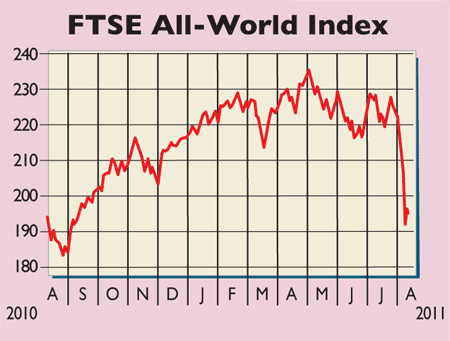Get the latest financial news, insights and expert analysis from our award-winning MoneyWeek team, to help you understand what really matters when it comes to your finances.
You are now subscribed
Your newsletter sign-up was successful
Want to add more newsletters?

Twice daily
MoneyWeek
Get the latest financial news, insights and expert analysis from our award-winning MoneyWeek team, to help you understand what really matters when it comes to your finances.

Four times a week
Look After My Bills
Sign up to our free money-saving newsletter, filled with the latest news and expert advice to help you find the best tips and deals for managing your bills. Start saving today!
Stockmarkets have suffered the worst selling and volatility spell since the panic of late 2008. By Monday night, the FTSE All-World Index had lost 15% in just over a fortnight. Major indices, including the FTSE 100, slipped into bear market territory, down by 20% from their latest peak in May. The S&P fell by 6.6% on Monday. Stocks steadied after US Federal Reserve chairman Ben Bernanke promised to keep interest rates at near 0% for two years and hinted at more quantitative easing, or money printing.
Ratings agency Standard & Poor's decision to downgrade the US's triple-A credit rating spurred selling, as did the endless euro crisis. The European Central Bank bought some time by buying Italian and Spanish bonds.
What the commentators said
"We believe the bull market that began in 2009 is probably over," said Andrew Engel of Leuthold Group. The outlook is certainly grim. One cause of panic has been the existential crisis in the eurozone, "where leaders have been behaving like headless chickens", said Alex Brummer in The Daily Mail. Given that Europe moves "at a pace that would shame snails", as The Economist put it, nobody believes that policymakers will finally get ahead of events. Welcome to "the euro crisis, part 394".
MoneyWeek
Subscribe to MoneyWeek today and get your first six magazine issues absolutely FREE

Sign up to Money Morning
Don't miss the latest investment and personal finances news, market analysis, plus money-saving tips with our free twice-daily newsletter
Don't miss the latest investment and personal finances news, market analysis, plus money-saving tips with our free twice-daily newsletter
The S&P downgrade, by contrast, was hardly unexpected and thus not something to "hyperventilate" about, as David Rosenberg of Gluskin Sheff pointed out. But it was an important reminder that "the screws have been tightened on the fiscal stimulus front" and that there is no scope for any more stimulus.

That reinforces investors' main worry: that poor recent data, especially in the US, shows we are heading back into recession, while the authorities have no more ammunition to fight the downturn. Towering debt rules out stimulus packages and central banks have already slashed rates to zero. Money printing hasn't made much difference to growth and could be highly inflationary.
Investors have finally come to realise that the recovery in the developed world is not self-sustaining: after a debt bubble bursts, the economy is fragile and prone to relapse. Just weeks ago, markets looking forward to recovery "could see an oasis across the desert", said HSBC's David Bloom. Now they have "woken up to the fact" that they were looking at a "mirage".
Get the latest financial news, insights and expert analysis from our award-winning MoneyWeek team, to help you understand what really matters when it comes to your finances.
MoneyWeek is written by a team of experienced and award-winning journalists, plus expert columnists. As well as daily digital news and features, MoneyWeek also publishes a weekly magazine, covering investing and personal finance. From share tips, pensions, gold to practical investment tips - we provide a round-up to help you make money and keep it.
-
 Barings Emerging Europe trust bounces back from Russia woes
Barings Emerging Europe trust bounces back from Russia woesBarings Emerging Europe trust has added the Middle East and Africa to its mandate, delivering a strong recovery, says Max King
-
 How a dovish Federal Reserve could affect you
How a dovish Federal Reserve could affect youTrump’s pick for the US Federal Reserve is not so much of a yes-man as his rival, but interest rates will still come down quickly, says Cris Sholto Heaton

